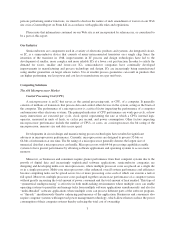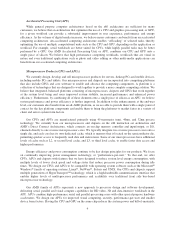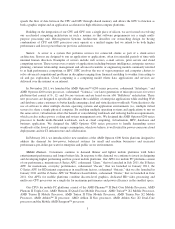AMD 2011 Annual Report Download - page 15
Download and view the complete annual report
Please find page 15 of the 2011 AMD annual report below. You can navigate through the pages in the report by either clicking on the pages listed below, or by using the keyword search tool below to find specific information within the annual report.Game Consoles. Semiconductor graphics suppliers have leveraged their core visual and graphics
processing technologies developed for the PC market by providing graphic solutions to game console
manufacturers. In this market, semiconductor graphics suppliers work alongside game console manufacturers to
enhance the visual experience for users of sophisticated video games. We leverage our core visual processing
technology into the game console market by licensing customized GPUs for graphics in videogame consoles such
as the Microsoft®Xbox 360™ and Nintendo Wii.
Marketing and Sales
We sell our products through our direct sales force and through independent distributors and sales
representatives in both domestic and international markets pursuant to non-exclusive agreements. Our sales
arrangements generally operate on the basis of product forecasts provided by the particular customer, but do not
typically include any commitment or requirement for minimum product purchases. We primarily use purchase
orders, sales order acknowledgments and contractual agreements as evidence of our sales arrangements. Our
agreements typically contain standard terms and conditions covering matters such as payment terms, warranties
and indemnities for issues specific to our products.
We generally warrant that our products sold to our customers will conform to our approved specifications
and be free from defects in material and workmanship under normal use and service for one year. Subject to
certain exceptions, we also offer a three-year limited warranty to end users for only those CPU and AMD
A-Series APU products that are commonly referred to as “processors in a box” and for PC workstation products.
We have also offered extended limited warranties to certain customers of “tray” microprocessor products and/or
workstation graphics products who have written agreements with us and target their computer systems at the
commercial and/or embedded markets.
We market and sell our products under the AMD trademark. Our desktop PC product brands for
microprocessors are AMD A-Series APU, AMD E-Series APU, AMD FX, AMD Phenom, AMD Athlon and
AMD Sempron. Our mobile PC brands for microprocessors are AMD A-Series APU, AMD E-Series APU, AMD
C-Series APU, AMD Z-Series APU, AMD Phenom, AMD Turion, AMD Athlon and AMD Sempron. AMD
Athlon processors and AMD Turion processors are sometimes marketed using the “Neo” model designator for
low power products targeted at the thin-and-light mobile segment. Our server brand for microprocessors is AMD
Opteron. We also sell low-power versions of our AMD Opteron, AMD Athlon, AMD Turion , AMD Sempron
and AMD Embedded A-Series processors as embedded processor solutions. Our product brand for the consumer
graphics market is AMD Radeon. Our product brand for professional graphics products is AMD FirePro. We also
market and sell our chipsets under the AMD trademark.
We launch or update new platforms for consumers in the desktop and mobile markets under our VISION
Technology from AMD brand. We designed VISION Technology to simplify the buying process for consumers
by more clearly connecting our brand to the level of activities that consumers want to perform on the
PC. VISION Technology contains multiple levels of increasingly rich PC system capabilities to address the
diverse needs of today’s PC users.VISION Technology initially was comprised of four levels of PC system
capabilities: VISION, VISION Premium, VISION Ultimate and VISION Black. In January 2011, we introduced
our VISION Technology brand for our low-power APU products, consisting of VISION E1 and VISION E2 for
our entry level PCs. In June 2011, we launched our VISION Technology brand for performance series APUs
consisting of four levels of PC system capabilities: VISION A4, VISION A6, VISION A8, and VISION FX.
These VISION tiers are for 2011 and later systems powered by our APUs and provide increasingly higher PC
capabilities. VISION E1, E2, and A4 based desktops and notebooks are targeted at PC users who require basic
digital media consumption such as watching DVDs, photo viewing, casual gaming, listening to music, and
Internet browsing. VISION A6 and A8 based desktops and notebooks are designed to allow a greater computing
performance for digital consumption and creation. These activities include watching HD movies, photo editing,
DirectX 11 gaming, multi-tasking, and video editing. VISION FX desktops are based on the AMD FX processor
and an AMD Radeon HD 6000 or HD 7000 series graphics card. These VISION FX systems are designed to
9
























